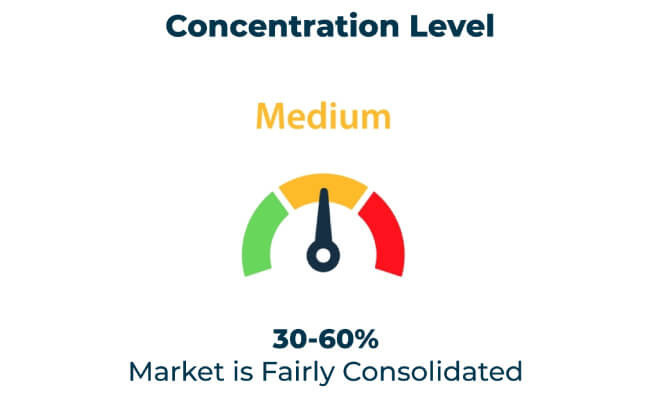The respiratory inhaler devices market is moderately concentrated. The top 10 players in the market share around 54.8% of the overall market. GSK plc leads with a commanding share of 22.6%, followed by AstraZeneca at 16.1%, and Cipla Ltd. at around 10%. These companies maintain dominance through strong portfolios, strategic market positioning, and established distribution networks.
Cumulatively, Tier 2 players include Boehringer Ingelheim, Viatris, Teva Respiratory and others, contributing 20-25% through their specialized capabilities and regional market presence.
| Attribute | Details |
|---|---|
| Estimated Industry Size (2025E) | USD 41,037.3 Million |
| Projected Industry Size (2035F) | USD 66,329.8 Million |
| Value CAGR (2025 to 2035) | ~4.9% |
The market is expected to reach USD 66,329.8 million by 2035, with a CAGR of 4.9%. The key growth drivers are the increasing prevalence of respiratory diseases such as asthma and COPD, growing awareness of the benefits of inhalation therapy, and continuous technological advancements, including smart inhalers and digital health integration.
Patient-centric devices, improved drug delivery mechanisms, and sustainability have been the recent focus areas, including eco-friendly inhalers. The "Others" segment includes Chinese and regional players, with a market share of 27%.
Competitive advantages include lower production costs, a better understanding of the local markets, and developing export capabilities. Partnerships and licensing deals with international companies have helped them reach global markets.
For niche and emerging players, underserved segments, for example pediatric or geriatric, will be the challenge to serve with differentiated offerings. Partnerships with global leaders to scale up their presence and deepen their R&D capacities are the core focus areas for niche players. Price pressure, strict regulatory requirements, and the fast pace of innovation keep the major players on their toes and the market a competitive place.
Explore FMI!
Book a free demo
Rising global air pollution and increasing awareness of respiratory health are driving demand for these devices. Additionally, growing emphasis of market players on introduction of new products to the market anticipate the market growth.
The respiratory inhaler devices market encompasses dry powder inhalers (DPIs), metered-dose inhalers (MDIs), and nebulizers. These respiratory device inhalers are primarily used to manage respiratory disorders.
Global Market Share 2025
| Category | Industry Share (%) |
|---|---|
| Top 3 Companies | 48% |
| Rest of Top 5 | 25% |
| Others | 27% |
Type of Players
| Type of Player | Industry Share (%) |
|---|---|
| Top Global Giants | 55.4% |
| Mid-Sized Players | 38% |
| Regional and Niche Players | 6.6% |
The respiratory inhaler devices market is moderately consolidated. Tier 1 players, which account for 48% of the market, include AstraZeneca, GlaxoSmithKline, and Cipla Ltd.. They dominate through extensive product portfolios, strong global networks, and continued innovation efforts.
Tier 2 players, which account for 25% of the market, such as Lupin Ltd. and Chiesi, focus on providing affordable solutions and expanding regionally to increase their footprint. Lastly, Tier 3 players contribute 20% of the market and include regional manufacturers targeting underserved demographics and addressing specific needs with customized products.

Year-over-Year Leaders
| Region | Market Share (%) |
|---|---|
| North America | 37% |
| Europe | 32% |
| Asia-Pacific | 25% |
| Rest of the World | 6% |
Regional Highlights
Key performance indicators include smart inhaler adoption rates, biologics-compatible device penetration, and market expansion in emerging regions.
The market is set to evolve through digital health advancements, biologics integration, and environmentally friendly innovations. Companies that prioritize regional expansions and patient-specific solutions will drive the next growth phase.
Emphasis of manufacturers on introduction of new products to the market, along with their strategic initiatives towards expansion of their market presence in emerging nations anticipate the growth of the market.
Definitions
Nebulizers
Nebulizers are machines that convert liquid medication into a fine mist or aerosol for direct inhalation into the lungs. Nebulizers are effective for delivering higher doses of medication over an extended period.
Research Methodology
This report combines primary and secondary research. Primary data comes from industry expert interviews, while secondary data is derived from market reports, government publications, and company filings.
The global Respiratory Inhaler Devices Market is projected to witness a CAGR of 4.9% between 2025 and 2035
The global Respiratory Inhaler Devices Market represents a sale of USD 41,037.3 Million in 2025
The global Respiratory Inhaler Devices Market is expected to reach USD 66,329.8 Million by 2035
Key manufacturers of Respiratory Inhaler Devices include AstraZeneca, Beximco Pharmaceuticals Ltd., Boehringer Ingelheim GmbH, Cipla Ltd., GlaxoSmithKline plc., Koninklijke Philips N.V., Merck & Co., Inc., OMRON Healthcare Europe B.V., PARI Medical Holding and Teva Pharmaceutical Industries Ltd
Human Combinatorial Antibody Libraries (HuCAL) Market - Trends & Forecast 2025 to 2035
Dental 3D Printing Material Market Trends, Growth & Forecast by Material, Product, and Region through 2035
Healthcare Digital Experience Platform Market Trends - Growth & Forecast 2025 to 2035
Human Growth Hormone (HGH) Treatment and Drugs Market Trends - Growth & Forecast 2025 to 2035
Healthcare Interoperability Solutions Market Analysis – Trends & Growth 2025 to 2035
High-end Cellomics Market Analysis - Growth, Trends & Forecast 2025 to 2035

Thank you!
You will receive an email from our Business Development Manager. Please be sure to check your SPAM/JUNK folder too.